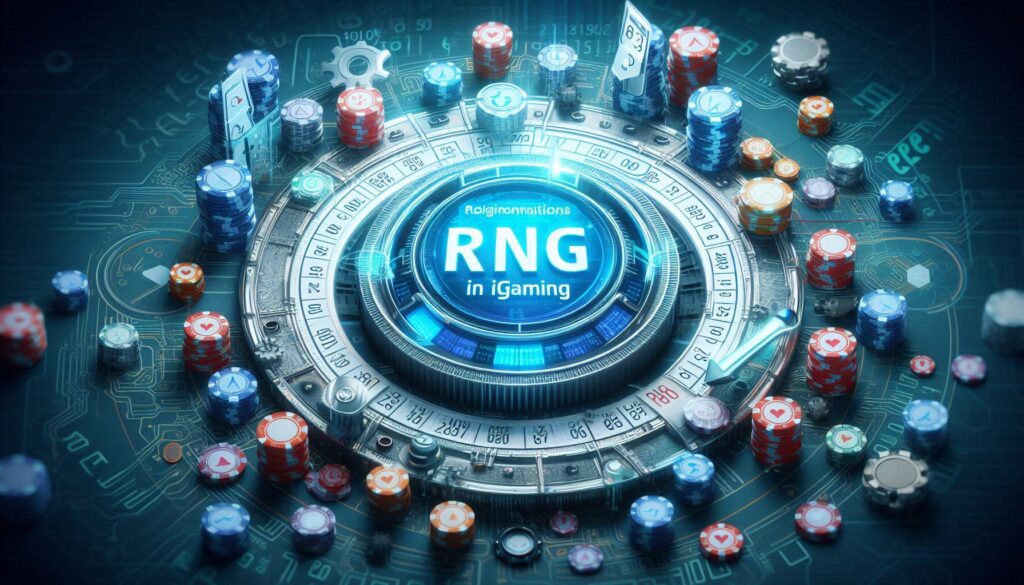
What is RNG in iGaming: The Algorithms of Fair Play

By Manuela
In iGaming, fairness and transparency are crucial for player trust. Random Number Generators (RNGs) play a key role in ensuring games are unpredictable and equitable.
Discover the mechanics and significance of RNGs in maintaining the integrity of your favourite online games.
The iGaming industry has seen significant growth, captivating millions worldwide with its convenience and variety. As more players join virtual casino floors, the demand for fair and transparent gaming experiences increases. Central to this trust is the use of sophisticated technologies like Random Number Generators (RNGs).
So what is RNG in iGaming? By generating random numbers that cannot be predicted, RNGs ensure a level playing field for all participants. This technology is crucial for maintaining fairness across digital gaming platforms, ensuring that every spin, card draw, or dice roll is entirely independent of past results. There’s more to it than that, though.
Hopefully, this quick write-up will help you understand what RNG in iGaming is.
How RNG Works

The basic mechanics of RNG involve complex algorithms designed to generate sequences that lack any discernible pattern. These algorithms use initial values known as seeds to start the randomization process, ensuring that outcomes remain unpredictable and independent from one another. Advanced RNG systems employ both software-based pseudo-random number generators and hardware random number generators to enhance security and unpredictability.
The technology behind RNG is critical to its function; without reliable algorithms, games could be susceptible to manipulation. Software developers constantly innovate these systems to prevent fraud and maintain integrity. By implementing robust mathematical models, they create a gaming environment where outcomes remain truly random.
Understanding these mechanics allows players to appreciate the complexity involved in keeping games fair and secure. It underscores the importance of choosing reputable platforms that prioritize cutting-edge technology for their game offerings.
Modern RNG systems also incorporate entropy pools – collections of random data from various environmental sources like atmospheric noise, user inputs, and hardware timing variations. These entropy pools provide additional randomization layers that make the number generation process even more unpredictable. When combined with cryptographic algorithms, this multi-layered approach creates a robust system that can withstand sophisticated attempts at prediction or manipulation while maintaining the speed necessary for seamless gameplay.
Testing and verification of RNG systems involves sophisticated statistical analysis methods like chi-square tests, runs tests, and serial correlation assessments. These evaluations ensure the generated numbers meet strict criteria for randomness and distribution. Regular testing cycles analyse millions of outcomes to detect any potential biases or patterns that could compromise game fairness. This rigorous approach to validation helps maintain the highest standards of randomness and unpredictability in modern iGaming platforms.
Importance of RNG in iGaming
The significance of RNG in iGaming cannot be overstated—it underpins the entire gaming and user experience by guaranteeing fair play. Players invest not only their money but also their time and emotions into these games; thus, ensuring equity becomes a cornerstone of any credible platform’s operations. Without dependable RNG systems, the industry would struggle with issues related to mistrust and potential fraud.
RNGs play a pivotal role across various game types—from slots to poker to sports betting—ensuring each activity’s integrity remains intact. When engaging with diverse offerings such as live casinos or sports betting services, players can rest assured knowing that RNG technology underpins every transaction they make.
This focus on fairness directly impacts customer satisfaction levels by providing an environment where skill can shine unimpeded by external tampering or bias-driven outcomes.
The implementation of RNG technology also plays a crucial role in responsible gaming initiatives. By ensuring truly random outcomes, it prevents players from developing false beliefs about patterns or systems that could lead to problematic gambling behaviours. This randomness helps maintain the entertainment aspect of gaming while discouraging potentially harmful strategies based on perceived patterns or superstitions, ultimately contributing to a healthier gaming environment.
RNG and Game Development

Game developers face unique challenges when integrating RNG into their designs. They must balance creating engaging gameplay experiences while ensuring randomness remains at its core—a task requiring meticulous attention during development phases.
Innovations within this space continue pushing boundaries as developers explore new ways to harness artificial intelligence alongside traditional algorithmic approaches—creating ever-more immersive experiences without compromising fairness standards set forth by trusted entities.
This continual evolution highlights how vital it is for companies to adapt swiftly amidst technological advancements while maintaining high ethical standards expected by discerning audiences worldwide.
Ensuring Fair Play with RNG
iGaming platforms take several measures beyond internal checks to guarantee their RNG systems’ integrity remains uncompromised over time—third-party audits being one such measure frequently utilized across top-tier operators globally today!
Auditors conduct rigorous testing procedures designed specifically around evaluating these systems’ performance under various conditions before certifying them compliant according to applicable regulations set forth by industry-wide best practices guidelines established by organizations and regulatory bodies alike. This commitment to transparency, honesty, and accountability serves to reinforce public confidence in the sector, ultimately benefiting everyone involved in the ecosystem.
Author Profile
- Blogger and Marketer by Passion | Senior Online Media & PR Strategist at ClickDo Ltd. | Contributor to many Education, Business & Lifestyle Blogs in the United Kingdom & Germany | Summer Course Student at the London School of Journalism and Course Instructor at the SeekaHost University.
Latest entries
 EntertainmentOctober 30, 2025System Architecture and Probability Modeling in Online Slot Development
EntertainmentOctober 30, 2025System Architecture and Probability Modeling in Online Slot Development EntertainmentOctober 28, 2025Authority Through Data: How Gaming Platforms Can Use RTP Transparency to Build Trust
EntertainmentOctober 28, 2025Authority Through Data: How Gaming Platforms Can Use RTP Transparency to Build Trust BusinessSeptember 19, 2025Top 3 Reasons an SEO Agency Needs a White Label Web Development Partner
BusinessSeptember 19, 2025Top 3 Reasons an SEO Agency Needs a White Label Web Development Partner EntertainmentJuly 24, 2025Gamification Meets Growth: Why Slot Platforms Are Adopting Startup Mindsets
EntertainmentJuly 24, 2025Gamification Meets Growth: Why Slot Platforms Are Adopting Startup Mindsets
